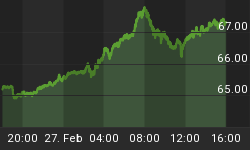That the US is in the early stages of what could be called the "American Spring" is wonderfully ironic. Well, there is a lot of irony going around these days, but will a popular uprising be successful in the US?
Or anywhere else?
Political and economic repression prevails in a country with a constitution that was intended to be proof against ambitious cliques. Growth of arbitrary government represents a pernicious political revolution and it's been on for over a hundred years. In the process, 19th century liberals have become 21st century authoritarians. The civil service is no longer impartial and insists upon using the apparatus of government to promote its will. Checks and balances essential to sound government have been overwhelmed by the most versatile movement in political history. Political Correctness has virtually decimated any opposition to authoritarian government.
How can anyone say "No!" to the concept that central bank currency depreciation and manipulation of interest rates provides wonderful economic growth? Similarly, that massive increases in taxation and regulation can prevent bad things from happening to the climate.
Both are arbitrary.
The "Arab Spring" that erupted two years ago was not successful, nor was the "Prague Spring" of 1968.
Authoritarians throttled both protests.
Will the "American Spring" be successful?
You bet!
There have been a number of popular uprisings that have been based upon the concept of limited government.
The most recent was symbolized by the fall of the Berlin Wall in 1989. Eastern Europeans looked at the promises of the governing classes, looked at how well the apparatchiks were living and, then, looked at how much prosperity was getting down to the average person.
Ending the Soviet Union marked a huge step in a global movement on what will eventually be called a Great Reformation.
It was a daunting prospect, but individual dissatisfaction and determination overwhelmed the AK-47s of the collective.
Historically, there have been two kinds of revolutions. Those that fall into the hands of neurotic intellectuals and become brutally authoritarian. Salient examples were the French and Russian Revolutions.
Then there are the great movements that were essentially conducted by business interests, small holders and just plain folks. The American Revolution of 1776 and England's Glorious Revolution of 1688 are the best examples of a dynamic movement towards limited government.
The "Glorious" was the effort that finally got rid of absolutist government in England.
When the public eventually puts government stupidity and government bullying together amazing things can happen.
The Sixteenth Century recorded a massive experiment in authoritarian government funded by confiscatory taxation, chronic depreciation and debt-default. Religion played a huge part in everyday life, but as the public became more critical it examined every facet of over-bearing bureaucracies.
Formally called the Protestant Reformation, it should be called the Great Reformation.
In the Twentieth Century, ambitious government bureaucracies "invented" the same method of finance. When the limit of confiscatory taxation is reached, the state resorts to depreciation, debt issuance and - on the way - default.
At the moment, too many believe that policymakers have created a perpetual motion financing machine. Asset bubbles can go on forever.
England's history provides the least-bloody reformation. Financial highlights of it are instructive - and amusing.
A long dynamic expansion ended in the early 1600s and the contraction was accompanied by rising unemployment. An adventurer in public policy, by the name of Cockayne noted that Holland was getting a big mark-up of finishing cloth. Cockayne argued that the British Crown should duplicate those facilities in England.
Merchants of the day, looked at the scheme and described it as a Sepulchre. "Attractive without, dead bones within."
Some called the meddling "Tyrannical Duncery", which term is also appropriate to today's grand bureaucratic schemes.
In so many words, veteran traders and merchants had vivid descriptions of bureaucratic scheming. The contraction turned vicious in 1618 prompting another scheme whereby government could ease the distress by throwing credit (from where?) at a credit contraction. In the 1550s, Gresham noted that distress always followed speculation.
While widely practiced, "duncery" as a term is rarely used. Today's veteran traders would call such schemes in any century as "stupid". All that is needed to end this massive bout of intrusion and depreciation is for enough of the voting-public to realize that it is indeed "stupid".
At that point the "American Spring" will be underway. It is choosing a leader now.
England's vote to leave the bureaucratic EU is a profoundly important step towards another popular uprising that could be called a Great Reformation. A hundred years of in-your-face and in-your wallet politics is exhausting itself in two ways.
In the political arena and in the financial markets.















